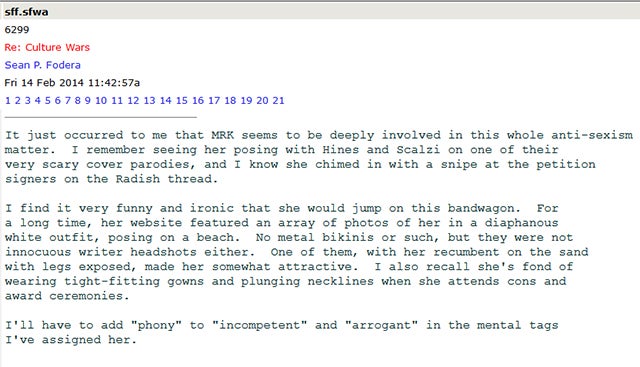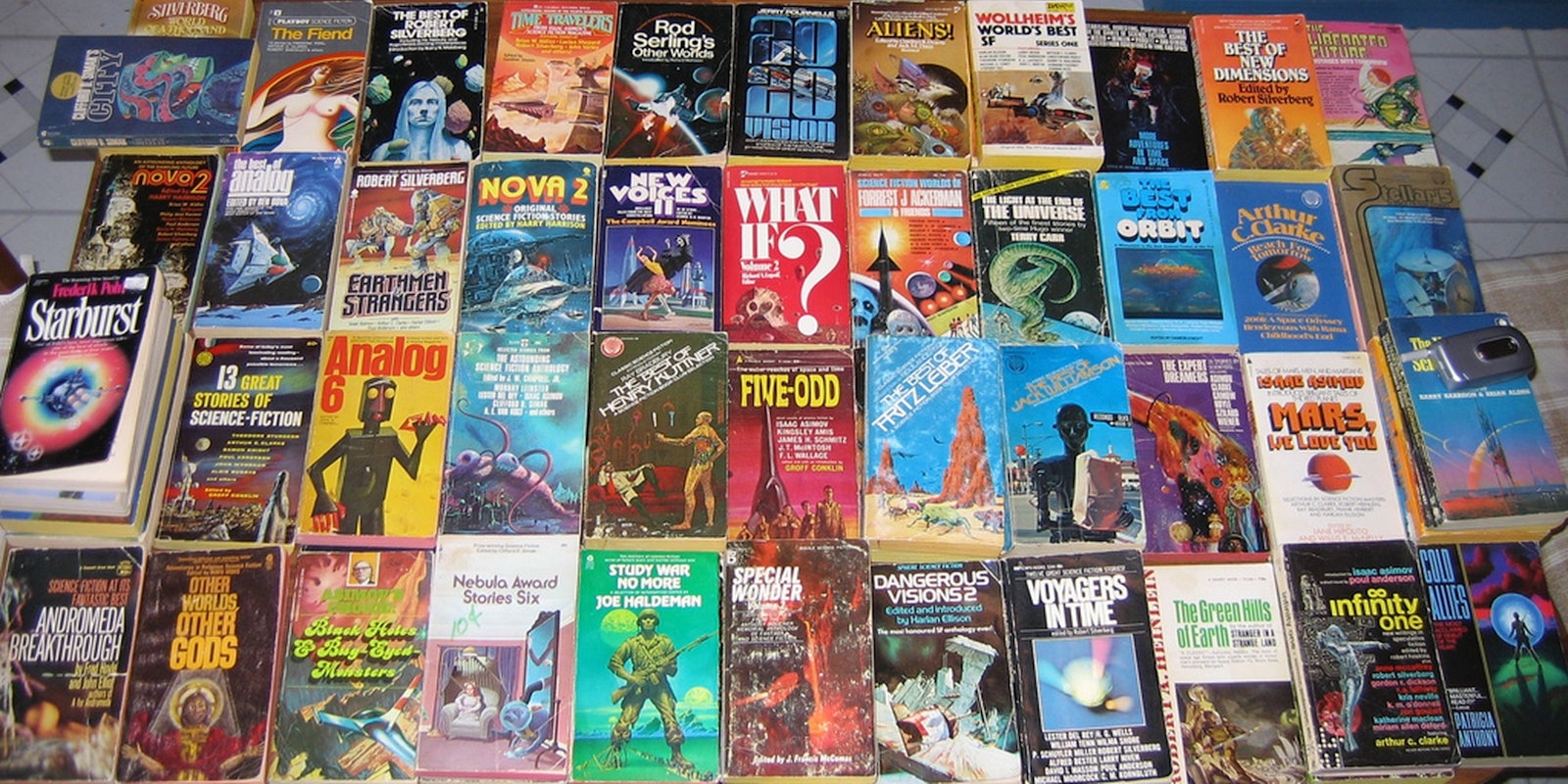A conversation on a science-fiction forum this week revealed a section of the community that’s teeming with indignation about recent attempts to make the genre more progressive.
Just when readers thought the dust had settled on last week’s debate about “political correctness” in sci-fi publishing, a group of highly influential writers spent the past few days lamenting the rise of increasingly vocal women and minorities in their community. The discussion happened on a list-serv thread where the participants apparently thought no one would notice them—at least until they remembered all their posts were public.
Predictably, a new Tumblr is posting excerpts from the conversation, presumably as a way of highlighting just how real the problems with sexism and discrimination in speculative publishing really are. And spoiler alert: It’s not pretty.
Among the participants who are displeased at the recent influx of diversity in their community is award-winning author Raymond Feist, who eyerolled at “fugheads determined to use the organization to further their own agenda.”
Another participant, Sean P. Fodera, ranted about writer Mary Robinette Kowal, painting her feminism as hypocrisy. Why? Because she sometimes takes full-body photographs and wears dresses with low necklines, apparently:

Screengrab via webnews.sff.net
This isn’t a new debate. Last year the editor of the Science Fiction and Fantasy Writers of America (SFWA) newsletter resigned over widespread allegations of sexism. From numerous harassment incidents at sci-fi cons, to a systemic lack of diversity, to major uphill battles for women and writers of color for representation in all areas of the sci-fi publishing industry, tensions between the “old guard” of white male sci-fi publishing and the new diverse community who wants more progressive media are rapidly coming to a boil.
The new thread offers a glimpse into how systemic the divide really is. Fodera is the associate director of contracts for Macmillan, one of the industry’s largest publishers. He calls Kowal, who is a Hugo-award-winning author, “an unperson… no one you should have heard of.” Then he goes on to compare her to an aggressive dog:
“Oh, I know she has no power over me. Still, I get agitated when I think about her. There was a lot of good I could have done for SFWA, and she was a primary factor in my not being able to do it… In a way, it’s like my reaction to dogs… My brain kept saying ‘it’s a service dog; they’re well-trained; he won’t hurt you,’ but my body wanted nothing more than to dump my bowels and flee…”
Last year, Kowal spoke out against 12 members of the SFWA who had, she claimed, harassed her while she served as vice president and secretary of the organization. Calling them “rabid weasels,” she noted, “I spent four years in office and the first year I almost quit because I got so tired of getting hate mail.”
The SFWA is a relatively small organization—just 1,800 members—but it wields great cultural influence. Members of the SFWA are responsible for nominating the Nebula, a major science-fiction award. When women like Kowal have to fight routine harassment just to participate in spaces like the SFWA, it makes it that much harder for them to write, publish, and be accepted, much less critically recognized for their works. And Kowal’s harassment experience in geek spaces is by no means an isolated one.
Though Fodera isn’t a current member, he has a longtime affiliation with the group. And the hundreds of messages on the thread from members and nonmembers prove that he’s not alone.
But these days, the sci-fi community is an increasingly large, public place. And with the advent of instant communication across the Internet, more voices are coming to the table and speaking out:
Okay, it’s official. I’m running for Eastern Regional Director of @sfwa.
— Sarah Pinsker (@SarahPinsker) February 15, 2014
@bethwodzinski Thanks! Be the change, etc.
— Sarah Pinsker (@SarahPinsker) February 15, 2014
On the thread, a handwringing Fodera opined, “I think there’s a battle worth fighting. SFWA needs saving.”
But more and more, the long-marginalized fans of science fiction are lining up to save their community from gatekeepers like Fodera.
Update: In an extended two-part statement, Fodera apologized to the women of the science fiction community and to Mary Robinette Kowal directly, claiming his “statements were extreme and unnecessary” and that Robinette is “a very talented writer, deserving of the accolades and awards she has achieved.”
Writing about the impact of women on the genre, he says:
At no time did I ever indicate that I “don’t want women to write science fiction”, as stated in The Daily Dot. … I have a teenage daughter. … With very few exceptions, the books I bring to her attention are by female writers. These are the writers with whom she most identifies, and with whom I most want her to identify. These female genre writers inspire her, and I would do nothing to impede that. Her storytelling skills are quite good, and I would love to see her follow in their footsteps.
I am not now, nor have I ever been, nor will I ever be, antithetical to female writers in our genre or any genre. … Once again, I sincerely apologize to all parties for the unprofessional nature of my comments that began the events of this week. It was thoughtless, unworthy of me, and unfair to many of you. I will be far more diligent in composing my thoughts in online venues going forward.
Responding to the apology, Kowal stated, “I accept without reservation,” and said she regretted that Fodera felt alienated during her tenure serving on the board of the SFWA.
Photo via phillipstewart/Flickr (CC BY-2.0)


